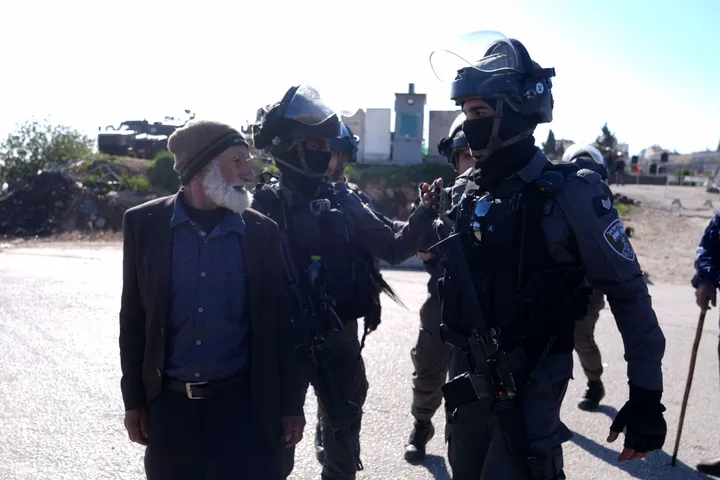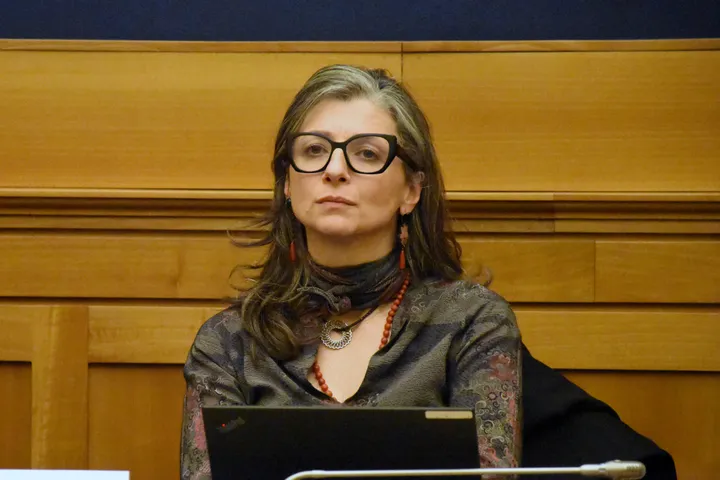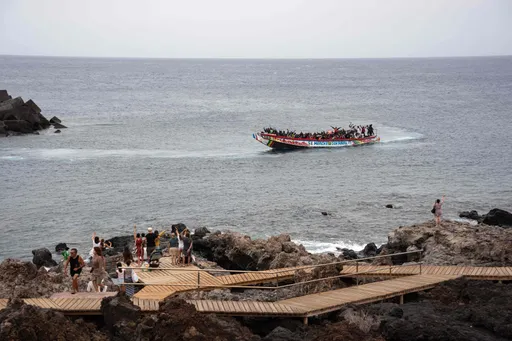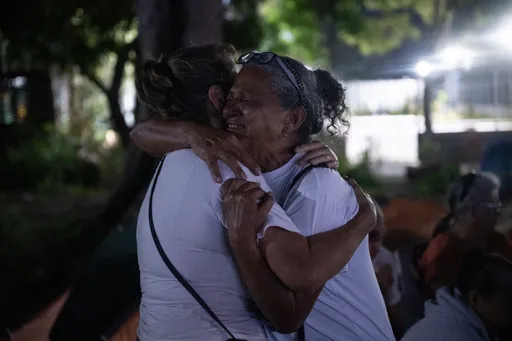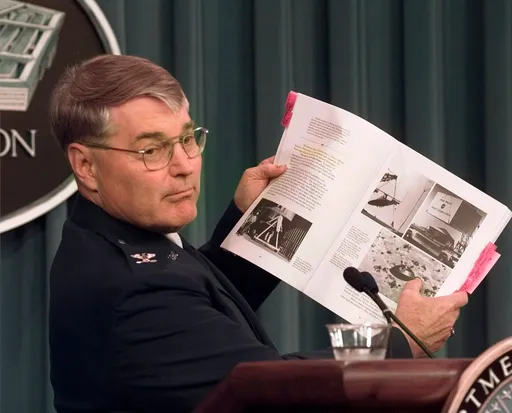More than two months after Hamas' unprecedented cross-border attack on October 7, the Israeli government's allegations of sexual violence by Palestinian resistance fighters have resurfaced as headlines in major international media outlets such as BBC, CNN, New Yorker, and New York Times.
These outlets have published explicit stories of alleged sexual violence, including accounts of gang rape and mutilation.
This renewed focus on the issue comes after the Israeli army held exclusive screenings for invited journalists of what it claims are eyewitness accounts of alleged Hamas crimes.
The 47-minute footage titled 'Bearing Witness to the October 7 Massacre' was screened on multiple occasions. However, Israeli officials have refused to share the footage with news agencies to report on and verify the contents independently.
This detail holds great significance. Despite offering extensive coverage of information conveyed by Israeli officials in these news reports, all of them carry a subtle disclaimer: that they cannot independently "verify individual allegations and claims".
In its quest for a thorough understanding of the significance of independent verification, TRT World contacted the UN, Human Rights Watch, and Amnesty International, organisations which investigate sexual violence allegations in conflict zones, to reveal the methods, approaches, and procedures they employ for verification.
"We are required to gather information from a wide variety of reliable sources (including civil society, victims' organisations, concerned states and non-state actors) to verify the veracity of the information we received," Reem Alsalem, UN Special Rapporteur on violence against women and girls, its causes and consequence, tells TRT World.
She emphasises the importance of verifying reports of sexual violence and conducting thorough investigations independently, as highlighted in two previous press releases addressing Israel's accusations of sexual violence attributed to Hamas – one on November 20 and the other on December 14.
Reliable sources
When asked about the crucial steps that investigative teams deem essential in probing allegations of sexual violence in conflict zones, Lauren Aarons, Amnesty International's senior adviser on gender and conflict, concurs with the UN Special Rapporteur, emphasising the necessity to gather information from a diverse array of reliable sources.
"We rely primarily on information we have collected ourselves, supported by other information we trust or have been able to verify," she states. "We also seek information from all other relevant sources to be able to develop a full, comprehensive and reliable understanding of the facts, as well as what needs to happen next to ensure justice and the rights of survivors."
Regarding the sources cited by the Israeli government for their evidence, they predominantly involve individuals directly associated with the Israeli government, security services, or seemingly civilian institutions with connections to Israeli government officials and institutions.
Specifically, Israel's case relies on video testimony from a single eyewitness at the music festival, witness testimonies from body collectors of the Zaka organisation, military forensic teams, and army personnel, along with photographs suggesting potential sexual assaults on women.
Additionally, testimonies from Hamas fighters were obtained through Israel's Security Agency Shin Bet, known for its use of torture to elicit fake confessions.
Take, for instance, the involvement of body collectors as witnesses from the rescue and recovery organisation Zaka. Advertised as Israel's foremost non-governmental organisation in this field, it has 3,000 volunteers and receives funds from the Israeli government.
This is also the same organisation that propagated a fabricated story about babies being beheaded by Hamas. Yossi Landau, the head of operations at Zaka, claimed to have seen bodies of beheaded babies, a statement that has been refuted even by Israeli newspapers.
Furthermore, Zaka has become entangled in a web of scandals, with its leaders facing charges of sexual assault, rape, and child exploitation.
Cochav Elkayam-Levy is another figure portrayed by media outlets as the head of "the Civil Commission on October 7th Crimes by Hamas against women and children". She is also a law professor who has herself faced criticism for alleged human rights abuses.
More specifically, she offered a guidebook-style legal rationale for the Israeli authorities' handling of Palestinian prisoners on hunger strike, particularly those held in administrative detention without trial. She proposed the controversial method of force-feeding, which is widely regarded as a form of torture and unequivocally contravenes fundamental human rights principles.
Elkayam-Levy is also the founder and director of the Dvora Institute, which works as a close advisory body to the Israeli prime minister's National Security Council. The advisory committee for the Dvora Institute includes a former director of the Israeli Prime Minister's Office and three former officials in the National Security Council.
All of these suggest that Israel's rape accusations, attributed to Hamas, rely on anything but a wide variety of unreliable, one-sided sources echoing the Israeli state's narrative.
However, the question remains: Can we believe what Israel says based on the evidence provided by these not-so-reliable sources?
Where is the evidence?
Not only are the sources in question but also the evidence presented during interviews, briefings and screenings of footage provided by the Israeli state raise concerns.
Israel has consistently fallen short in furnishing news organisations with forensic evidence, concrete photographic proof, or victim testimonies, relying instead on inferences from its forensic teams and individuals mentioned above who evidently have ties to the Israeli government.
Currently, Israel's case relies on the video testimony of a sole eyewitness at the Nova music festival, detailing the purported gang rape, mutilation, and execution of one victim.
News reports also indicate that Israeli police claim to have "multiple" eyewitness accounts of sexual assault, but they have not provided further clarification on the exact number. Furthermore, it has been reported that Israeli police have not yet interviewed any of the purported rape survivors.
So far, Israeli government officials have yet to provide concrete information regarding the precise number of so-called victims. In investigations by prominent international organisations into such allegations, details such as the number of victims and their testimonies, dates, times, and locations play a crucial role in identifying key patterns and specific details to substantiate the allegations.
Reports from the UN, HRW, and Amnesty International on sexual violence incidents in conflict zones, including Sudan, Ethiopia, Afghanistan, Central African Republic, Libya, Iraq, Colombia, and numerous others in the last two years, have consistently included these critical pieces of information, a contrast to Israeli government's statements.
For instance, Amnesty International shared with TRT World the comprehensive array of evidence they gather and the meticulous steps taken to ensure the authenticity and reliability of such evidence:
Their collection methods encompass interviews with victims/survivors to capture their experiences and eyewitness accounts, discussions with witnesses directly involved, consultations with parents or guardians, especially in cases involving children, dialogues with medical professionals, community leaders, first responders, police, social workers, and other relevant individuals.
Additionally, they scrutinise medical or forensic records and assess any available video evidence, photos, and satellite imagery. Moreover, their investigative approach incorporates statements from the forces accused of sexual violence and interviews or responses from national authorities or armed groups implicated in such allegations.
Regarding the steps taken to establish authenticity and reliability, these encompass "identifying consistent patterns in accounts, aligning testimonies by survivors, witnesses and medical professionals, especially focusing on key patterns and particular details, videos and satellite imagery to corroborate certain aspects of reports, information from medical providers is sought, or other consistent with the patterns identified."
Unsubstantiated claims
Among those who attended one of the briefings of the Israeli government was British journalist Owen Jones, who released a YouTube video providing a detailed account of the Israeli state's screening session concerning these accusations.
"Some high-profile crimes are not substantiated by this footage", he notes, adding, "If there was rape and sexual violence committed, we don't see this on the footage either."
In the video, he emphasises the need for independent verification of the rape accusations, stating, "All of the footage in the possession of the Israeli state should be given over to independent journalists and professional analysts to build a fully accurate picture of exactly what happened that day."
However, the Times of Israel asserts that the Israeli army will not provide forensic evidence, stating that "physical evidence of sexual assault was not collected from corpses by Israel's overtaxed morgue facilities." According to reports, it is now considered too late to gather conclusive evidence.
Israel employs a systematic campaign of rape accusations as a weapon of war, expecting those who hear these narratives not to demand proper evidence but rather to believe them unquestioningly. This campaign also targeted women activists and groups advocating for a ceasefire in Gaza.
Samantha Pearson, the director of the Sexual Assault Centre at the University of Alberta in Canada, is among the individuals who have courageously pointed out the lack of verification in these accusations. Alongside dozens of academics and civil society organisations, she signed a letter highlighting the "repeated and unverified accusation that Palestinians were guilty of sexual violence".
The letter did not deny the occurrence of sexual violence but emphasised the insufficient evidence to support these accusations. What followed was even more intriguing, as Pearson was terminated from her position a few hours after signing this open letter.
Not cooperating at all
Israel not only refrains from providing any evidence for these allegations but goes even further by refusing to cooperate with international organisations that have previously conducted numerous investigations on the matter.
A recent example is their rejection of a visit from the UN High Commissioner for Human Rights, Volker Turk, amid growing concerns over the escalation of violence in its war on Gaza. Israel stated, "Israel is not aware of any additional benefit to a visit from the High Commissioner at this time."
The Israeli state has consistently refused to collaborate with UN fact-finding missions, often casting doubt on the facts and figures released regarding their policies imposed on Palestinians.
However, the UN special rapporteur informed TRT World that they have recently requested official visits from both the Israeli government and Palestine.
The statement reads, "I have also asked both the State of Palestine and Israel to carry out an official visit to the occupied Palestinian territories (West Bank and Gaza) as well as Israel next year, focusing on the violence that has taken place against Israeli and Palestinian women since October 7, 2023. The request has been recently made, and I am awaiting their response."
The Israeli government's willingness to cooperate with the UN this time remains uncertain, but recent instances suggest a leaning towards promoting the existing narratives they already keep pushing.

